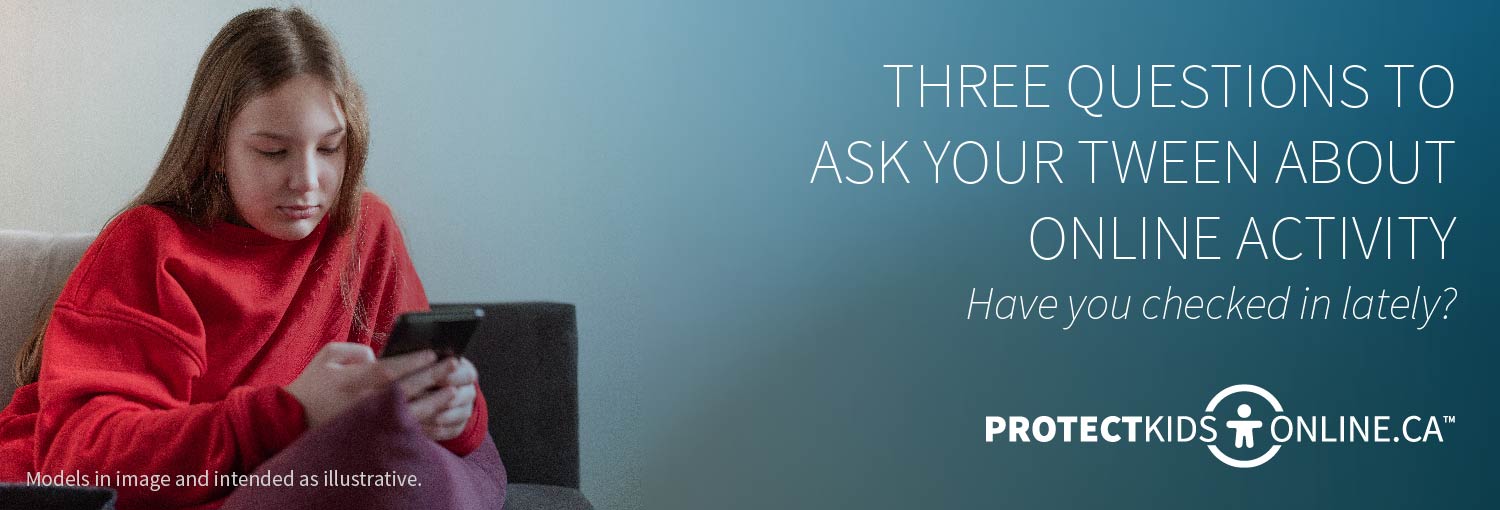Three questions to ask your tween about online activity

Have you checked in lately?
Talking to your kids about online safety isn’t a one-and-done conversation. Having regular check ins can make an impact on how your child responds to unsafe situations online. You can approach these conversations as another way to get to know your child. Here are three questions that can help start conversations with your kids about their online activity.
1. How do you spend your time online?
Knowing where your tween spends their time on the computer, tablet, or cell phone can help focus conversations on the potential risks on these platforms. Approach the conversation with curiosity (more, “I’m interested to know what you find fun,” less, “this is an interrogation, tell me everything you do online”). For example, if your tween plays games online, you can ask what the game is about, or if they play it alone or their friends. If your tween watches videos or livestreams online, ask them where they watch (e.g. YouTube®, Twitch®) and what they like to watch.
- Remind your tween that they should not share any personal information online (where they live, where they go to school, their full name, etc.). This includes in their username or any kind of bio they have associated with the account they use to play games or watch content (this blog explains the risks). Usernames are public and can be seen by anyone.
- Learn more about Instagram® Live, Twitch, and TikTok®, which are all platforms that have livestream abilities; as well as about the parental controls on YouTube.
2. Who do you chat with online?
Many popular games or social platforms include some kind of chat function; this could be an in-game chat, or a livestream chat, or a comment section under a video. Tweens may not understand that people aren’t always who they say they are online and there are risks with talking to someone they don’t know in real life. It can also be really hard to tell if someone is lying about who they are - their social profiles look real, they talk like a tween, and they seem like they genuinely want to get to know you. Predators use these tactics to lure kids and manipulate them into sending sexually explicit photos or videos.
- Explain to your tween that if anyone asks them to send images or videos or go on a video call with them online, they need to tell you.
- Talk to your tweens about not sharing images and videos online without your consent and that they should never livestream without your permission. Images and videos can be misused online and people can take screenshots or screen record livestreams, creating a record (here’s more info about risks we’ve seen with livestreaming).

3. Have you encountered anything that makes you feel uncomfortable or confused online?
If your tween is online there’s a chance they’ll encounter sexual content (whether they search it out or not). They are not developmentally ready to be exposed to sexually graphic material, so it’s important that if they do see something online, they feel comfortable talking to you about it.
- Tweens might be afraid to tell their parents or caregivers about uncomfortable stuff online because they’re afraid of getting in trouble. Assure them that it’s not their fault if they’ve seen something that makes them feel weird or uneasy; they can talk to you about it without losing their device or internet privileges.
- Tweens may also turn to pornography to understand sexual experiences; if you find that your tween has encountered pornographic material, explain that this content often shows unhealthy relationships and should not be viewed as an example of a safe and healthy partnership.
For more information about online safety, check out our free brochure, Parenting in the Online World.